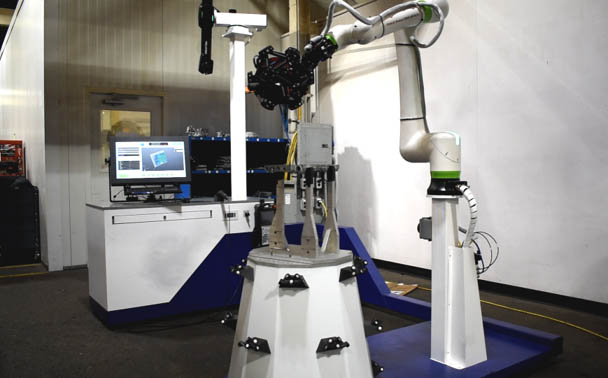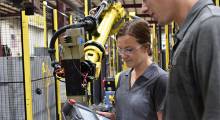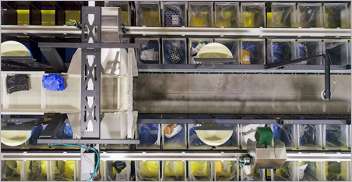The ARM Institute today announced that it has named Jim Clark from ARIS Technology and Christopher Ravasio from ARIN Technologies Inc. as fellows to lead two R&D projects. The ARM Institute Fellowship program supports the AIM Higher Consortium, a Defense Manufacturing Community.
“The ARM Institute is proud to support Defense Manufacturing Communities,” stated Matt Fischer, senior new business development manager at the ARM Institute. “These regional clusters are integral for strengthening U.S. defense manufacturing capabilities, and our fellowship program in partnership with the AIM Higher Consortium is critical to advancing much-needed robotics and AI solutions.”
The AIM Higher Consortium supports an industrial production ecosystem that combines advanced metals and materials with Industry 4.0 technologies such as robotics, artificial intelligence, and additive manufacturing (AM). As ARM Institute Fellows, Clark and Ravasio will work on separate projects in West Virginia and Southwestern Pennsylvania.
ARIS Technology manager to work on inspections
Clark is the technology project manager for metrology at Chicago-based ARIS Technology. He has more than 20 years of experience with 3D design and metrology. Clark leads a team of industry experts, providing systems for 3D scanning, 3D engineering, and rapid prototyping.
ARIS said it provides end-to-end systems for autonomously collecting and analyzing data. The company's robotic scanning systems use AI, and it offers clients a user experience (UX) with technologies such as augmented reality (AR), digital twins and simulation, and AM for human-robot collaboration (HRC).
Before ARIS, Clark was the business unit manager for Konica Minolta's 3D scanning division, where he managed all aspects of 3D scanner sales and service in North and South America. Prior to that, Clark responsible for the development of Maglev Inc.'s system designs, manufacturing, and metrology processes.
Clark's career started off at Jamison Design, where he was in charge of designing a variety of mechanical systems including assembly automation, automotive components, consumer products, stamping dies, and injection molds.
Clark will focus on advancing a previously funded ARM Institute project: “Human-Robot Collaboration in Quality Inspection to Empower Workforce to Easily Program and Operate Automated 3D Scanning.”
His project will develop an effective and efficient method of collecting, preparing, and annotating data for AI modeling. It is intended to help bridge both physical and training gaps between expert roboticists and non-robotics skilled technicians.
ARIN Technologies engineer to develop SLAM
Ravasio is an electrical engineer at ARIN Technologies, which has developed a collision-avoidance system that uses ultra-wideband (UWB) technology to avoid workplace accidents that occur between human-operated forklifts and workers, as well as other equipment.
He is the primary developer of embedded systems software implemented in ARINAlert forklifts. Ravasio is also the principal product assembler responsible for construction and testing of final product, as well as development of technical manuals and instructions regarding assembly.

In addition, he is the lead quality-assurance tester in charge of verifying reliability of new software and hardware designs.
ARIN Technologies claimed that its highly accurate indoor alerting and localization systems can improve productivity and safety in indoor work. The Pittsburgh-based startup said it uses UWB technology to achieve GPS-like capabilities indoors at a low cost with two products.
ARINAlert is a collision-avoidance system intended to improve worker situational awareness and reduce forklift accidents. ARINTrack is an indoor positioning system (IPS) that allows customers to track and find company assets in any type of facility.
ARIN said its proprietary systems can mitigate risk and optimize processes for clients by improving visibility. It added that it has partnered with some of the largest companies in the U.S. to deliver these systems to their customers.
Ravasio will lead development of robotic navigation system based around UWB positioning with ultrasonic and laser obstacle detection. The system will be designed to work “out of the box.”
The project will further develop and repurpose an existing product that ARIN currently uses for collision avoidance in industrial environments. It aims to create a fully functioning technology that solves the problem of simultaneous localization and mapping (SLAM).
About the ARM Institute and AIM Higher Consortium
The Advanced Robotics for Manufacturing, or ARM, Institute is a Manufacturing Innovation Institute (MII) funded by the Office of the Secretary of Defense under Agreement Number W911NF-17-3-0004. Founded in 2017, it is part of the Manufacturing USA network.
The Pittsburgh-based institute has an ecosystem of more than 330 members and partners across industry, academia, and government. Its goal is to make robotics, autonomy, and AI more accessible to U.S. manufacturers of all sizes and to improve workforce training. The ARM Institute seeks to strengthen the U.S. economy, global competitiveness, and national security and resilience.
In 2021, the institute selected Dr. Jared Glover from CapSen Robotics as its first fellow. The ARM Institute recently announced a call for projects to advance AI and robotics for manufacturing.
The AIM Higher Consortium is led by the Catalyst Connection and is funded by the U.S. Department of Defense through the Office of Local Defense Community Cooperation (OLDCC)’s Defense Manufacturing Community Support Program. The consortium seeks to strengthen the defense supply chain in the Greater Pittsburgh region of Southwest Pennsylvania and West Virginia.
AIM Higher exists to support small and midsize manufacturers that currently support or are actively pursuing opportunities in the defense space. Interested parties can learn more at the Catalyst Connection's Web site.
Article topics
Email Sign Up
















